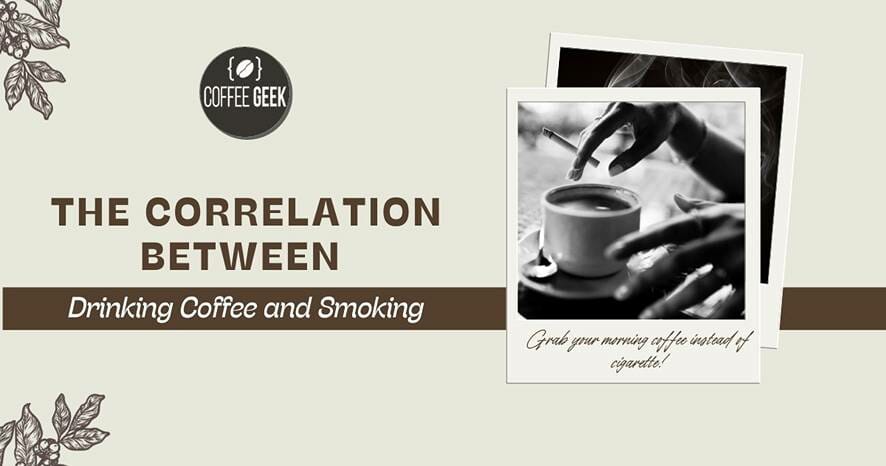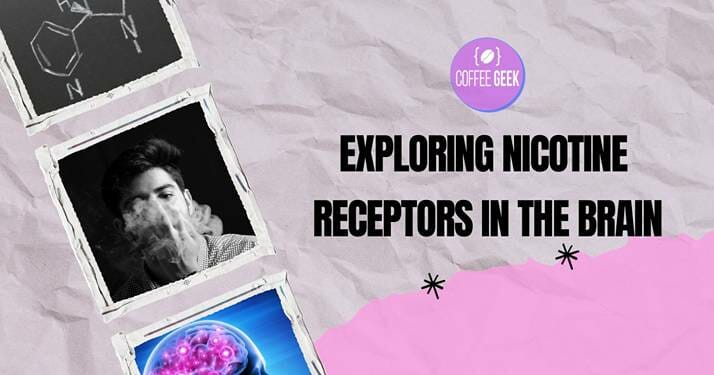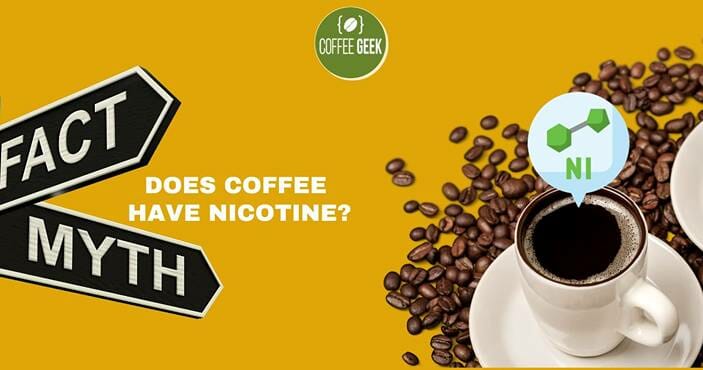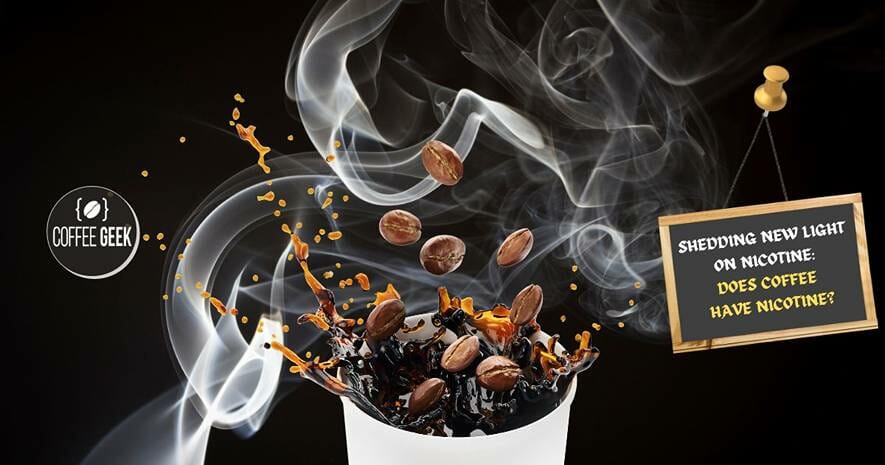In today’s investigative journey, we shed new light on nicotine and attempt to answer a surprising question: does coffee have nicotine?
While it’s common knowledge that a cigarette is the go-to source for nicotine, does our humble morning brew share the same trait? The results might surprise you.
But for the short answer:
Very low traces of nicotine may be detected in coffee, but these levels are negligible and not a concern for consumers.
Read on as to how it could possibly get there.
Understanding the Nature of Coffee: What Does It Contain?
Before addressing the question head-on, let’s first explore the compound and caffeine content of coffee beans. Hundreds of different molecules make up the complex world within each tiny bean.

Released upon roasting, these compounds bring to life a world of exotic flavors and enticing aromas. Among them, the most noteworthy is caffeine.
While not a source of nicotine, caffeine has its potent, awakening effects that our mornings crave.
The Effects of Morning Coffee Consumption
The effects of morning coffee consumption extend beyond banishing the night of sleepiness. The caffeine within it acts on our brain, lifting the fog of morning weariness, and setting the stage for productivity.

New research sheds light on the biomarker of coffee consumption suggesting that it influences our cognitive and metabolic processes in ways that we are just beginning to understand.
Biomarker of Coffee Consumption: What Does Research Say?
The latest research sheds new light not only the caffeine’s effect but also on the other molecules in coffee, questioning whether they may contain a substance like nicotine receptors in the brain.

This proposition gives a whole new perspective on how our coffee can satisfy our morning nicotine cravings.
Can Your Morning Brew Satisfy Nicotine Craving? Does Coffee Have Nicotine?
The Correlation between Drinking Coffee and Smoking
There’s a strong correlation between drinking coffee and smoking, especially during the night of nicotine withdrawal. It seems the two substances are interconnected in ways that extend beyond the confine of mere habits.
Coffee, with its complex molecules, offers a range of sensations that could possibly mirror the ones experienced while smoking cigarettes.

Managing Morning Nicotine Cravings: The Role of Coffee
Some suggest that the humble mug of your preferred, dark-roasted coffee might play a more significant role in managing morning nicotine cravings than thought before.
This perspective opens up the possibility that drinking coffee may indirectly contribute to nicotine satisfaction.

The Intriguing Connection Between Coffee and Cigarettes
Exploring Nicotine Receptors in the Brain: The Role of Coffee
Nicotine binds to specific receptors in our brain, creating a pronounced psychoactive effect that smokers become addicted to.
Amazingly, some of the molecules in coffee, besides caffeine, might interact with the same neural pathways, provoking similar responses.

“If nicotine and coffee share some common biochemical pathways, it’s not a stretch to think that they could have similar psychological effects,” said Roger L. Ph.D., a leading researcher in this field.
Roasted Coffee Beans vs. Cigarette: Comparing Nicotine Levels
Comparing nicotine levels within roasted coffee beans and a conventional cigar, gives birth to the pressing question once again: does coffee have nicotine?
The nicotine content in a coffee can depend on a variety of factors, from the type of beans to the brewing process.
Coffee May Contain Nicotine: Fact or Myth?
While it seems like a myth that coffee may have nicotine, studies have speculated that coffee might house minute traces of this stimulant.

However, the amount of nicotine in coffee is so small that it likely won’t have a major effect on suppressing nicotine cravings.
| Question | Answer |
|---|---|
| Does coffee naturally contain nicotine? | No, coffee does not naturally contain nicotine. |
| Is nicotine found in coffee beans? | Nicotine is not a typical component of coffee beans. |
| Can nicotine be added to coffee? | Nicotine can be artificially added to coffee, but it is not a common practice. |
| Are there nicotine traces in coffee? | Very low traces of nicotine may be detected in coffee, but these levels are negligible and not a concern for consumers. |
| How does nicotine end up in coffee? | Nicotine can potentially be introduced through cross-contamination in processing or handling, but it is extremely rare. |
Examining the Nicotine Content in a Cup of Coffee
Understanding the Amount of Nicotine in Coffee – Does Coffee Have Nicotine?
To manage expectations, let’s be clear: the amount of nicotine in coffee is minuscule, almost insubstantial. If any, it’s not the nicotine in your drink that’s keeping you awake but rather the caffeine and its interaction with your brain’s neural pathways.
Human Nicotine vs. Molecules in Coffee: An In-Depth Look
The molecules in coffee and the human nicotine receptor system are complex subjects that demand deeper research.

While it’s established that coffee doesn’t contain significant amounts of nicotine, it does impact some of the same neural pathways, creating a sensation of alertness similar to that brought on by tobacco.
What Smokers Need to Know about Drinking Coffee
The Effect of Coffee on Smokers: A Critique
The effects of coffee on tobacco users are multifaceted. While coffee isn’t directly satisfying nicotine cravings, it provides a unique experience that people can enjoy separately or coincide with their smoking routine.
It’s still essential for smokers to remember that though coffee is not a source of nicotine, its enjoyment might be linked to their tobacco habits.
Exploring the Links Between Smoking and Coffee Drinking
Smoking and coffee drinking are two habits that have been linked for centuries, some might argue they complement each other.
But it is important to understand that coffee is not a nicotine source and should not be thought as a replacement to satisfy the cravings.
The true links between these two habits lie in how they provide comfort, stimulate the senses, and offer a fleeting moment of introspection that people desire.
Unveiling the Effects of Coffee on Tobacco Consumption
The effects of coffee on tobacco consumption are still not completely understood. Although coffee may not explicitly have nicotine, research suggests it can induce similar psychoactive effects on smokers.
So, while a hot coffee cannot substitute your nicotine source, it can serve as a companion on your potential voyage to the tobacco-free world.
Q&A
Does coffee contain nicotine?
No, coffee does not contain nicotine. Nicotine is a chemical compound found primarily in tobacco. While there are many chemical compounds in roasted coffee beans, nicotine is not one of them.
Coffee contains caffeine, a different type of stimulant that affects the brain organic receptors, but it doesn’t have nicotine.
Is there any relation between caffeine and smoking?
While both coffee (caffeine) and cigarettes (nicotine) are stimulants, there is no direct chemical link between them in terms of content.
However, culturally or habitually, some cigarette smokers want their coffee in the morning, along with cigarettes.
It’s important to note that any association is more behavior-driven rather than due to chemical compounds present in both substances.
Can a morning brew of coffee affect nicotine cravings?
Some research suggests that coffee may stimulate nicotine receptors in the brain, which could potentially heighten cravings for nicotine.
However, coffee itself does not contain, have nicotine and cannot replace the effects of nicotine in the body.
How do compounds in roasted coffee beans affect us in the morning?
Roasted beans contain many chemical compounds, including caffeine.
Caffeine has a stimulating effect on the brain, helping to increase alertness and reduce the perception of fatigue, which is why many people enjoy coffee in the morning.
Does drinking coffee in the morning have similar effects to morning nicotine cravings?
It is possible that drinking coffee can exacerbate the effects of morning nicotine cravings in habitual smokers. Caffeine can stimulate brain receptors that also respond to nicotine, which may further heighten these cravings.
However, more research is needed in this field.
How can chemical compounds in roasted coffee affect nicotine receptor dysfunction?
There are currently no studies explicitly linking the consumption of roasted beans and nicotine receptor dysfunction.
Given that coffee does not contain nicotine, it is unlikely that it could directly affect nicotine receptor function. Any possible connections could be due to behavioral associations, rather than chemical ones.
Can coffee be a good substitute for nicotine in the morning?
While coffee can provide a boost of energy in the morning due to its caffeine content, it is not a direct substitute for nicotine, which has a separate set of effects on the body.
However, for those trying to reduce nicotine intake, a morning hot cup of coffee could potentially help partly distract from nicotine cravings due to the stimulating effects of caffeine.
Can molecules in coffee that may light on nicotine and morning cravings?
No, molecules in coffee do not light on nicotine or morning cravings. However, the caffeine in coffee can stimulate brain receptors similar to nicotine, potentially heightening the sensation of craving in some people.
Why has coffee been studied less than nicotine for its addictive properties?
Nicotine is generally considered more addictive than caffeine, and nicotine addiction presents more severe health risks. As a result, it has garnered more attention in the scientific community.
That being said, research on caffeine addiction and its potential health impacts, such as that present in coffee, continues.
What ingredient in coffee might cigarette smokers crave?
The stimulating ingredient that cigarette smokers might also crave in coffee is caffeine. Both caffeine and nicotine stimulate certain brain receptors, creating a sense of alertness and satisfaction.
This connection is one reason why coffee and cigarettes are often habitually consumed together by some individuals.

